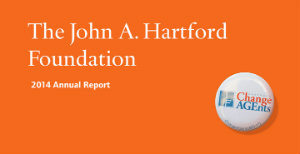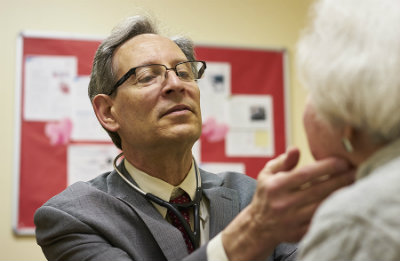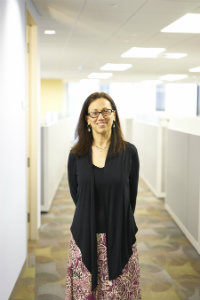 This is the last in a series of six Health AGEnda posts on the 2014 Annual Report.
This is the last in a series of six Health AGEnda posts on the 2014 Annual Report.Editor’s Note: The John A. Hartford Foundation’s 2014 Annual Report features five profiles of Hartford Change AGEnts whose work is representative of the kinds of practice and policy change the initiative is making. Read Harnessing the Power of Hartford Change AGEnts for more on the Change AGEnts Initiative. Today, we meet Renée Markus Hodin, Carol Regan, and Gregg Warshaw, MD, of Community Catalyst, who are working to bring the perspectives of older adults and aging-expert health professionals to efforts to improve care for the vulnerable population eligible for both Medicare and Medicaid. The John A. Hartford Foundation Board of Trustees recently approved a three-year, $1.5 million renewal grant to expand Community Catalyst’s work. This post concludes our special Health AGEnda series spotlighting the stories and videos of Hartford Change AGEnts profiled in the Annual Report.
As a geriatrician, Gregg Warshaw, MD, has watched with mounting frustration as older adults are bounced back and forth between nursing homes and hospitals—decisions often driven by the different financial models used by Medicare and Medicaid.
“It’s just not possible to provide good care with this fragmented system without huge effort,” Dr. Warshaw says. “We need to find a simpler way to manage the care of these patients that is more effective and more efficient.”
https://youtu.be/sOMqp4RJPi0
A former president of the American Geriatrics Society and former project leader for the John A. Hartford Foundation-funded Geriatrics Workforce Policy Studies Center, Dr. Warshaw is now working with Community Catalyst, a national, nonprofit health care advocacy organization, to realize this goal.
Through its Hartford-supported Voices for Better Health project, Community Catalyst is working to ensure that demonstration projects provide person-centered integrated care for people eligible for both Medicare and Medicaid in five states: Michigan, New York, Rhode Island, Washington, and Ohio. The John A. Hartford Foundation’s support leverages an initial investment from The Atlantic Philanthropies aimed at bringing consumer perspective to efforts to improve care for this vulnerable population.
“We’re supporting coalitions of health care advocates, including disability and senior organizations, to lend a consumer voice on the development and then implementation of the redesign of care,” says Renée Markus Hodin, Project Director of Voices for Better Health. “We’re trying to make sure the consumer voice is there—credible, visible, and able to go toe-to-toe with other stakeholders who are usually better funded and organized.”
Older adults represent approximately 60 percent of the dual eligible population and tend to be frailer and sicker than most Medicare beneficiaries. Hartford’s support is aimed at ensuring the demonstrations make use of geriatrics expertise and best practices in order to improve the quality of life for older adult dual eligibles.
Carol Regan, Senior Advisor to Community Catalyst, said: “A lot of our work is based in education and advocacy to get policymakers, health care plans, providers, and other consumer advocates to understand the importance of addressing geriatric care specifically.”
Adding Geriatrics Perspective to Advocacy
 Dr. Gregg Warshaw examines a patient at DuBose Health Center at The Cedars, a retirement community outside Chapel Hill, NC.
Dr. Gregg Warshaw examines a patient at DuBose Health Center at The Cedars, a retirement community outside Chapel Hill, NC.Dr. Warshaw, who directed the geriatric medicine program at the University of Cincinnati’s College of Medicine, is serving as a senior advisor to Voices for Better Health and worked with the Universal Health Care Action Network (UHCAN) Ohio to bring geriatrics expertise into the dual eligible demonstration project there before his recent move to North Carolina.
It was Ohio’s decision in 2012 to apply for the demonstration funded by the Centers for Medicare and Medicaid Services that led Dr. Warshaw to seek the skills and tools he believed he needed to influence public policy and be an effective advocate. He applied to the Health and Aging Policy Fellows program and was accepted, spending part of his fellowship working with Hodin, Regan, and UHCAN Ohio leaders.
“I really felt they were so far ahead of me in understanding the demonstration as well as understanding how we might have some influence on it that I would do nothing but gain by partnering with them,” Dr. Warshaw says. “And I’ve been fortunate that they felt there was something they had to gain by partnering with me. What we’ve learned is that the geriatrics perspective and clinical experience does add something to our advocacy.”
Regan says the Hartford funding has made it possible for Community Catalyst to enlist geriatric providers—mainly physicians, but also nurses, and increasingly, social workers—in each of the five states to work with the state coalitions.
 Renée Markus Hodin, Project Director of Voices for Better Health.
Renée Markus Hodin, Project Director of Voices for Better Health.“My main job has been talking to doctors about it, as well as talking with other organizations about the best ways to work with doctors to make the project successful,” Dr. Warshaw says. “A lot of my work has been trying to explain what the potential benefits are of integrated financing for the care of frail older people with Medicare and Medicaid. It’s not always obvious to everybody why that’s important and what it can offer. But having worked in this area for so long, I understand why it’s important.”
All three have taken an active role in the John A. Hartford Foundation Change AGEnts Initiative. Dr. Warshaw and Hodin attended the first annual Change AGEnts Conference in Philadelphia in December 2014. Hodin joined John A. Hartford Foundation Senior Program Officer Amy Berman in presenting at the conference on how to use traditional media and social media to build support for better care for older adults and their families.
The ability to network with the Change AGEnts has proven especially valuable; Community Catalyst has already expanded connections to geriatric social workers to support advocacy efforts.
“We’re getting as much as we give,” Hodin says.
Read previous Health AGEnda posts on the 2014 John A. Hartford Foundation Annual Report:
Cognitive Screening to Help Mitigate Post-Op Delirium
A Model CAPABLE of Creating Lasting Change
Honoring the Wishes of Nursing Home Residents
A Bridge to Better Lives for Family Caregivers
Creating Change Every Day: The 2014 John A. Hartford Foundation Annual Report
